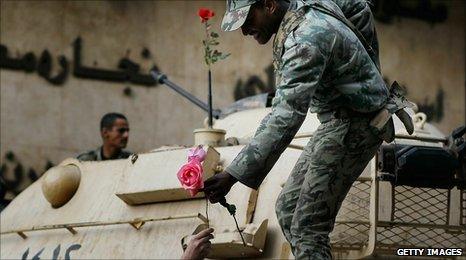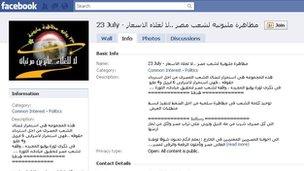Explained: Why there are angry demonstrations in Egypt
- Published

Egypt's army says it won't use force to remove anti-government protesters from the streets. It says their demonstrations are 'legitimate'.
It started with people deliberately setting themselves on fire outside government buildings.
More than a week later, protesters say a million people should gather in Cairo's Tahrir - or 'Liberation' - Square.
They say they won't stop unless Hosni Mubarak, who has been president for 30 years, quits his job.
So far, he's promised more jobs and political reform but there's still no sign he's willing to stand down.
Now the Egyptian army says it won't use force to stop the protesters.
Some tanks even have "Mubarak must go" scrawled on their sides.
It adds up to be the biggest challenge yet to the President's 30 year rule.
British tourists have been warned to get out of major Egyptian cities.
In America, President Obama and his Secretary of State Hillary Clinton have both talked about the need for an "orderly transition" in Egypt.
Activist Jihan, 23, told Newsbeat she was scared she'd be killed by police.
"They started shooting tear-gas and those sound-bombs," she said.
Widespread poverty
"I saw flames coming out of a gun with smoke. So I started running. Everybody was trying to hide."
Activists say they've been inspired by nearby Tunisia - where protests recently forced out an unpopular leader.
They've been spreading their message on sites like Facebook.

But there is evidence that the authorities have tried to clamp down on social networks to stop the activists getting organised.
Demonstrators are angry about a wide range of things - from widespread poverty and rising prices, to claims of torture and government corruption.
Egypt's president, Hosni Mubarak, has ruled since 1981.
There are widespread claims of rigged elections to keep him in power and many say his son will take charge when he stands down.
Much needed
Uncertainty in Egypt is always likely to be a worry for the UK and America.
It's a major shipping route through the Suez canal and the government there is a much needed ally in talks to find peace between Israel and the Palestinians.
If Hosni Mubarak is forced out - it could make the wider Middle East more volatile.
Trouble in the Middle East has a direct impact on your pocket.
We've seen the cost of crude oil top a hundred dollars a barrel lately.
That affects prices at the pump - and you can put it down to this kind of uncertainty.